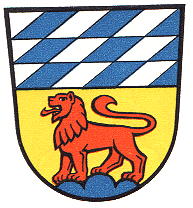Löwenstein: Difference between revisions
Knorrepoes (talk | contribs) m (Text replacement - "{{de}} '''" to "{{de}} '''") |
Knorrepoes (talk | contribs) m (Text replacement - "|center|Wappen von {{PAGENAME}}]] " to "|center|alt=Wappen von {{PAGENAME}} / Arms of {{PAGENAME}}]] ") Tags: Mobile edit Mobile web edit |
||
| Line 7: | Line 7: | ||
Additions : 1975 [[Hösslinsülz]] | Additions : 1975 [[Hösslinsülz]] | ||
[[File:lowenste.jpg|center|Wappen von {{PAGENAME}}]] | [[File:lowenste.jpg|center|alt=Wappen von {{PAGENAME}} / Arms of {{PAGENAME}}]] | ||
{| class="wikitable" | {| class="wikitable" | ||
Revision as of 11:33, 16 August 2022
This page is part of the German heraldry portal Deutsche Wappensammlung |
Heraldry of the World |
|
German heraldry:
|
Selected collector's items from Germany:
|
LÖWENSTEIN
State : Baden-Württemberg
District (Kreis) : Heilbronn
Additions : 1975 Hösslinsülz
| German |
In geteiltem Schild oben von Silber und Blau geweckt, unten in Gold auf blauem Dreiberg ein stehender roter Löwe. |
| English | No blazon/translation known. Please click here to send your (heraldic !) blazon or translation |
Origin/meaning
Löwenstein received city rights in 1287, but there are no seals known until 1498. The seal already showed the present arms, which are a combination of the arms of the Wittelsbach family (see Bayern), and the lion of Calw.Until 1281 Löwenstein was a possession of a branch of the Counts of Calw, who named themselves after the castle Löwenstein. The arms were also appropriate as Löwenstein means lion-stone. In 1281 it became a possession of King Rudolf I, who gave it to his illegitimate son Albrecht. In 1441 it was bought by Prince Friedrich of the Pfalz, of the Wittelsbach dynasty. His grandson received in 1494 the title Count of Löwenstein and he combined the two arms to form the present arms.
Contact and Support
Partners:
Your logo here ?
Contact us
© since 1995, Heraldry of the World, Ralf Hartemink 
Index of the site
Literature : Stadler, 1964-1971, 8 volumes.












